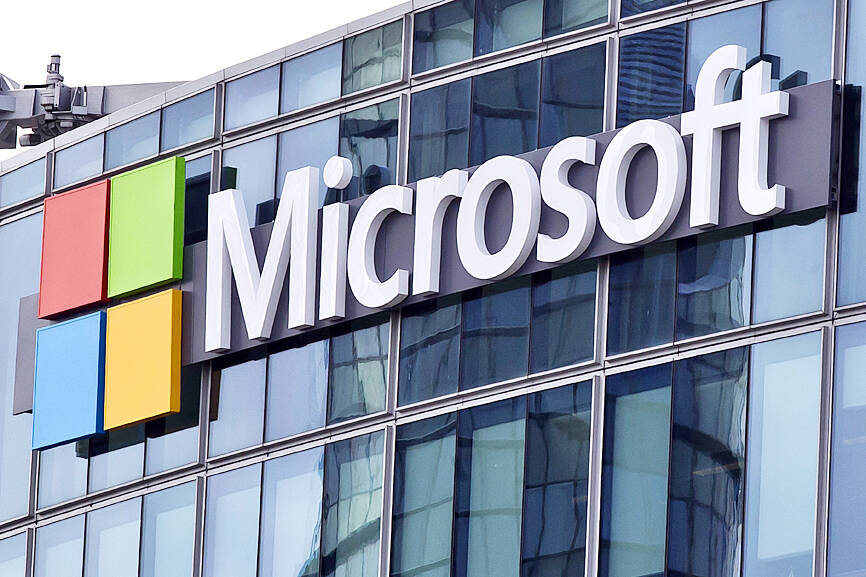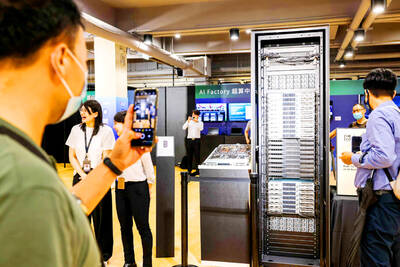Microsoft Corp will invest US$2.9 billion in data centers in Japan by next year, marking its biggest investment in the country, the Nikkei newspaper reported, citing an interview with Microsoft president Brad Smith.
The announcement will be made during Japanese Prime Minister Fumio Kishida’s visit to Washington this week and comes amid Tokyo’s push for more computing power for artificial intelligence (AI), according to the report.
Kishida arrived in the US on Monday for the first official visit by a Japanese leader in nine years, underscoring the increasing importance of the alliance between the two countries. He was scheduled to meet American business leaders yesterday before holding a summit with US President Joe Biden today.

Photo: AP
Microsoft will install advanced AI chips at two existing sites in eastern and western Japan. It will also unveil an AI-related reskilling program in Japan to train 3 million workers over three years and set up a research lab on robotics and AI, the Nikkei report said.
At the summit today, Biden and Kishida are expected to emphasize the strength of US-Japan ties in a wide range of areas including defense, economic security, key technologies like semiconductors, AI and quantum computing.
The Japanese leader is scheduled to visit a Toyota Motor Corp’s battery plant and a Honda Aircraft Co’s factory in North Carolina on Friday, where he’s likely to tout the benefits of Japanese investments for the US economy.
Japan is the top investing nation in the US with an amount of US$775.2 billion at the end of 2022, followed by Canada and the UK, according to the US Bureau of Economic Analysis. This is far bigger than China’s investment of US$44.8 billion.

LIMITED IMPACT: Investor confidence was likely sustained by its relatively small exposure to the Chinese market, as only less advanced chips are made in Nanjing Taiwan Semiconductor Manufacturing Co (TSMC, 台積電) saw its stock price close steady yesterday in a sign that the loss of the validated end user (VEU) status for its Nanjing, China, fab should have a mild impact on the world’s biggest contract chipmaker financially and technologically. Media reports about the waiver loss sent TSMC down 1.29 percent during the early trading session yesterday, but the stock soon regained strength and ended at NT$1,160, unchanged from Tuesday. Investors’ confidence in TSMC was likely built on its relatively small exposure to the Chinese market, as Chinese customers contributed about 9 percent to TSMC’s revenue last

With this year’s Semicon Taiwan trade show set to kick off on Wednesday, market attention has turned to the mass production of advanced packaging technologies and capacity expansion in Taiwan and the US. With traditional scaling reaching physical limits, heterogeneous integration and packaging technologies have emerged as key solutions. Surging demand for artificial intelligence (AI), high-performance computing (HPC) and high-bandwidth memory (HBM) chips has put technologies such as chip-on-wafer-on-substrate (CoWoS), integrated fan-out (InFO), system on integrated chips (SoIC), 3D IC and fan-out panel-level packaging (FOPLP) at the center of semiconductor innovation, making them a major focus at this year’s trade show, according

DEBUT: The trade show is to feature 17 national pavilions, a new high for the event, including from Canada, Costa Rica, Lithuania, Sweden and Vietnam for the first time The Semicon Taiwan trade show, which opens on Wednesday, is expected to see a new high in the number of exhibitors and visitors from around the world, said its organizer, SEMI, which has described the annual event as the “Olympics of the semiconductor industry.” SEMI, which represents companies in the electronics manufacturing and design supply chain, and touts the annual exhibition as the most influential semiconductor trade show in the world, said more than 1,200 enterprises from 56 countries are to showcase their innovations across more than 4,100 booths, and that the event could attract 100,000 visitors. This year’s event features 17

Hon Hai Precision Industry Co (鴻海精密), which assembles servers for Nvidia Corp, yesterday said that revenue last month rose 10.61 percent year-on-year, driven by strong growth in cloud and networking products amid continued front-loading orders for artificial intelligence (AI) server racks. Consolidated revenue expanded to NT$606.51 billion (US$19.81 billion) last month from NT$548.31 billion a year earlier, marking the highest ever in August, the company said in a statement. On a monthly basis, revenue was down 1.2 percent from NT$613.86 billion. Hon Hai, which is also a major iPhone assembler, added that its electronic components division saw significant revenue growth last month, boosted